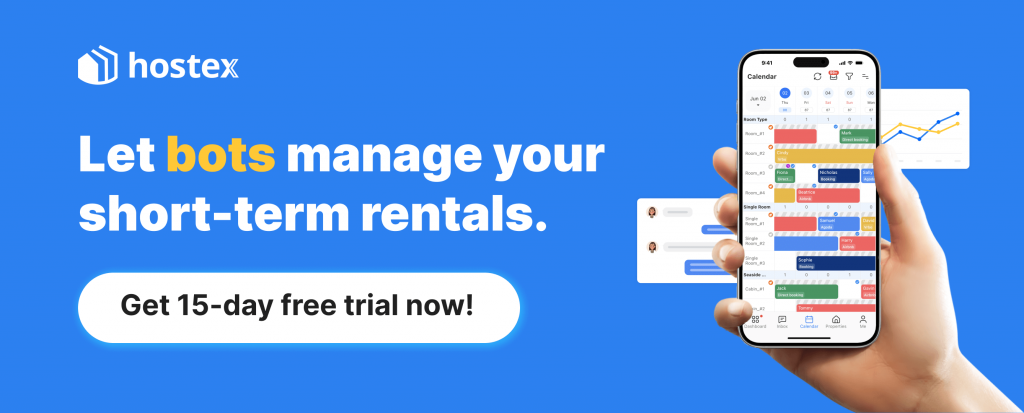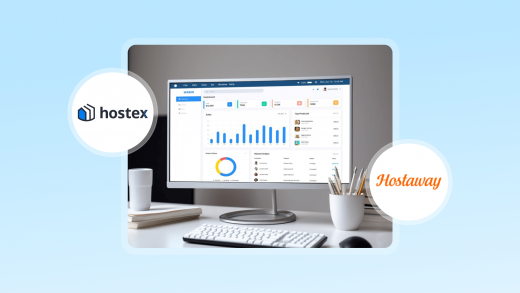Starting an Airbnb is easy, but standing out in a crowded market isn’t. You need a solid short-term rental marketing plan to attract potential guests and turn browsers into bookers.
Feeling overwhelmed? Don’t worry. In this article, we’ll share actionable short-term rental marketing tips to help you promote your vacation rental effectively.
With Hostex’s automated messaging, you can stay connected with guests 24/7—even while traveling or sleeping. Prompt, professional replies impress guests and boost your booking chances.

What is Short-Term Rental Marketing?
Short-term rental marketing is a strategic approach to promoting your vacation rental property to the right audience, maximizing occupancy and revenue. Unlike passively relying on platform traffic, it involves proactive promotion across multiple channels, including:
- OTA platform optimization (Airbnb, Vrbo, Booking.com)
- Social media marketing (Instagram, Facebook, TikTok)
- SEO (Search Engine Optimization) for direct bookings
- Local partnerships (tour operators, event organizers)
The goal? Stand out from competitors by building a unique brand and attracting more guests.
Why You Need a Strategic Short-Term Rental Marketing Plan
A solid marketing plan is the backbone of any successful business. It helps you prioritize efforts, achieve goals, and maximize resources efficiently.
1. Break Free from Platform Dependency
Platform algorithms favor listings with high bookings and stellar reviews, creating a “rich-get-richer” effect. If you rely solely on organic traffic, smaller hosts often struggle to gain visibility. A proactive short-term rental marketing strategy builds independent booking channels, reducing reliance on a single platform and boosting your property’s exposure.
2. Build a Sustainable Competitive Edge
With rising competition, generic listings and price wars are no longer enough. A structured marketing approach helps you:
- Define your unique value (location, amenities, experience)
- Build a strong brand identity
- Enhance guest loyalty.
This differentiation strengthens pricing power and creates premium demand beyond basic amenities.
3. Prepare for Market Volatility
The short-term rental industry faces seasonal dips, policy changes, and unexpected disruptions. A well-planned marketing system acts as a buffer by:
- Diversifying booking sources (OTAs, direct bookings, local partnerships)
- Using early-bird discounts to secure future bookings
- Developing a repeat guest program for steady revenue
4. Make Data-Driven Decisions
Scattered promotions generate fragmented insights, making ROI hard to measure. A strategic plan tracks key metrics like:
- Customer acquisition cost (CAC)
- Booking conversion rates
- Guest demographics
This data sharpens your marketing spend, ensuring every dollar delivers measurable results.

5 Key Questions to Ask When Creating Your Short-Term Rental Marketing Plan
A successful short-term rental marketing strategy starts with clear goals, audience insights, unique selling points, market analysis, and smart resource allocation.
1. What Are Your Goals?
Your objectives shape your entire marketing approach. Ask yourself:
- Increase bookings? Optimize listings, boost visibility, or adjust pricing.
- Raise revenue per booking? Offer add-ons like breakfast, airport transfers, or local experiences.
- Attract long-term guests? Provide weekly/monthly discounts.
- Improve guest satisfaction? Upgrade amenities, enhance communication, or gather feedback.
Think: What do you want to achieve in 6–12 months? Higher occupancy, profits, or ratings?
2. Who Is Your Target Audience?
Tailor your marketing to traveler types:
- Families: Need space, kid-friendly amenities (cribs, high chairs).
- Business travelers: Prioritize fast Wi-Fi, work desks, and transit access.
- Couples/Honeymooners: Love romantic decor, privacy, and unique experiences.
- Budget travelers: Seek affordability and shared spaces.
Think: Who is your property best suited for? What are their travel habits and budgets?
3. What Makes Your Rental Unique?
Stand out in a competitive market by highlighting:
- Location: Proximity to attractions, beaches, or downtown.
- Amenities: Pool, ocean-view balcony, smart home tech, or themed decor.
- Services: Free parking, bike rentals, or guided tours.
- Experiences: Local activities like cooking classes or wine tastings.
Think: What can you offer that competitors don’t? How can you grab guests’ attention instantly?
4. How Does Your Property Fit in the Market?
Understand your positioning by:
- Analyzing competitors: Compare pricing, reviews, and occupancy rates.
- Tracking demand: Peak vs. off-season trends, event-driven spikes (festivals, sports).
- Setting price tiers: Is your rental budget-friendly, mid-range, or luxury?
Think: Is your property the “best value” or a “premium experience”? How can you justify the price?
5. What’s Your Budget and Time Commitment?
Balance costs and effort:
- Free tactics: Optimize OTA listings, leverage social media, and encourage reviews.
- Paid ads: Google/Facebook ads, local tourism site partnerships.
- Other costs: Professional photos, website maintenance, and cleaning fees.
- Time: Are you managing it full-time or outsourcing to a property manager?
Think: What’s your budget? Which channels deliver the highest ROI?

9 Powerful Short-Term Rental Marketing Strategies to Boost Your Bookings
Standing out in the competitive vacation rental market requires a diversified marketing approach. Here are five proven strategies to maximize your visibility and revenue:
1. Build Your Direct Booking Website
Why It Matters:
- Avoid high OTA fees (12–15% commissions on Airbnb/VRBO).
- Strengthen your brand with a personalized booking experience.
- Collect guest data for email marketing and repeat bookings.
How to Do It:
Use Hostex’s Direct Booking Site Builder (no coding or fees).
- High-quality photos & virtual tours
- Instant booking system
- Secure payments (Stripe, PayPal)
- Special offers (e.g., “Book direct for 10% off!”)
2. List on Multiple Platforms
Why It Matters:
- Reach wider audiences (Airbnb, VRBO, Booking.com, etc.).
- Reduce risk from platform algorithm changes or policy updates.
Pro Tips:
- Sync calendars with Hostex’s channel manager to avoid double bookings.
- Adjust pricing/rules per platform (e.g., lower cleaning fees for budget travelers on Booking.com).
3. Get More 5-Star Reviews
Why It Matters:
- 90% of travelers check reviews before booking.
- Higher ratings = better search rankings on OTAs.
How to Get More Positive Reviews?
- Proactive Requests: Send a friendly email or message after checkout politely requesting a review.
- Provide an Excellent Experience: Ensure your property is clean, well-equipped, and consider offering small gifts (like welcome snacks or local guides).
- Respond Quickly to Guest Inquiries: Address issues promptly to demonstrate good customer service.
4. Master SEO & Google Marketing
Why It Matters:
- Rank higher on Google for direct bookings.
- Build trust with professional visibility.
How to Do It?
- List on GVR: Use Hostex to publish your property from your Direct Booking site to Google Vacation Rentals with one click.
- Keyword Research: Use tools like Google Keyword Planner to find popular search terms.
- Optimize Website Descriptions: Naturally incorporate keywords into your property descriptions, but avoid overstuffing.
- Run Google Ads: Target ads effectively to ensure your property ranks high in local searches and attracts potential guests.
5. Partner with Local Businesses
Why It Matters:
- Cross-promotion expands your reach.
- Add value with exclusive guest perks.
How to Do It?
- Travel Agencies: Partner with local travel companies to include your property in their recommended lists.
- Restaurants/Cafés: Offer discount vouchers to attract guests while encouraging businesses to recommend your property.
- Activity Providers: Collaborate with providers of experiences like rafting, skiing, or wine tasting to create bundled “stay + activity” packages.
6. Partner with Social Media Influencers
Why It Matters:
- Instant exposure to younger travelers (Gen Z & millennials).
- Long-term visibility: Influencer content keeps attracting bookings months later.
How to Do It?
- Target local travel/lifestyle creators (10K–100K followers for best ROI).
- Offer free stays for content or pay for sponsored posts.
- Focus on platforms like Reels, TikTok tours, or YouTube vlogs.
7. Leverage Social Media Marketing
Why It Matters:
- 75% of travelers discover rentals on social platforms.
- Visual platforms (Instagram/TikTok) showcase your property’s vibe.
How to Do It?
- Instagram/TikTok: Post 360° tours, guest testimonials, and local hidden gems.
- Facebook Groups: Share your listing in “[City] Travel Tips” groups.
- Pinterest: Create “Dream Vacation” boards linking to your booking site.
- Engagement boost: Run polls (e.g., “Beach condo or mountain cabin?”) and flash sales.
8. Email Marketing for Repeat Bookings
Why It Matters:
- Email subscribers are warm leads— 50% + more likely to book direct.
- Cost-effective: Reuse templates for seasonal promotions.
How to Do It?
- Collect emails at checkout (“Get 10% off your next stay!”).
- Send personalized offers and local guides.
- Must-haves: Mobile-friendly design, clear CTA (“Book Now”), unsubscribe option.
9. Traditional Print Ads (Yes, They Still Work!)
Why It Matters:
- Target Local Audience: Effectively reach local travelers, directly attracting those on road trips and nearby getaways.
- Credibility through Print Media: Printed materials enhance the authority of high-end properties, particularly appealing to quality guests in the middle-aged and older demographic.
- Cost-Effective Compared to Online Ads: Local print materials are cheaper and face less competition than online advertising, making them suitable for small-budget promotions.
How to Do It?
- Tourist hotspots: Place brochures at airports, visitor centers, or cafes.
- Local magazines: Buy ad space in regional travel issues.
- Community boards: Use tear-off flyers with QR codes for instant booking.
- Barter deals: Swap ad space with nearby restaurants (“Dine at X, get 15% off your stay”).

Conclusion
The outcome of the marketing battle often depends on whether you can focus your time on what truly matters.
However, the reality is that just as you’ve finished cleaning up after a guest’s checkout, you’re busy responding to inquiries from new guests; after adjusting your pricing on one platform, you’re faced with equipment repairs. When your time is fragmented by these mundane tasks, even the most carefully designed marketing plans can become mere theory.
This is why smart hosts are increasingly delegating repetitive tasks to tools. For example, using the Hostex Airbnb management system can automate 70% of routine work: from managing booking calendars and automatically responding to guest queries to sending check-in instructions, synchronizing prices across platforms, assigning cleaning tasks, and generating revenue reports.
What used to take you 10 hours a day can now be checked off in just 10 minutes. The time saved can be spent on activities that truly impact your business.




